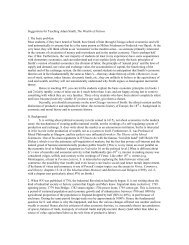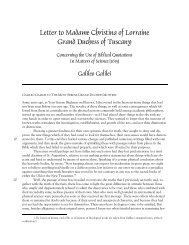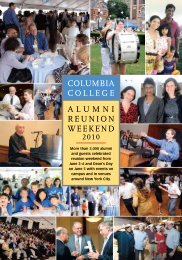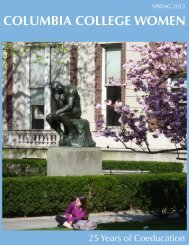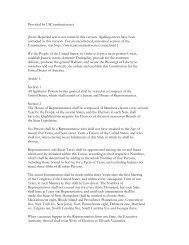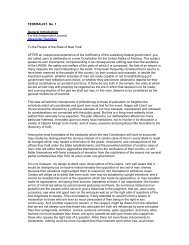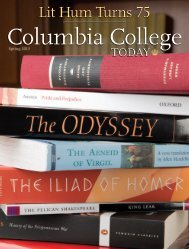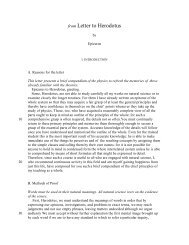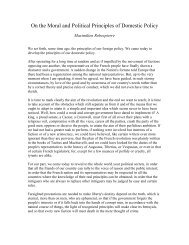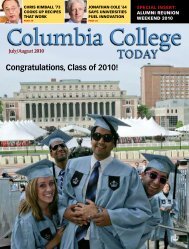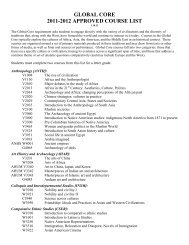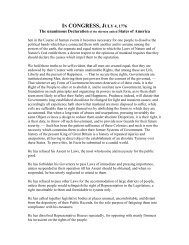Japan Storm - Columbia College - Columbia University
Japan Storm - Columbia College - Columbia University
Japan Storm - Columbia College - Columbia University
You also want an ePaper? Increase the reach of your titles
YUMPU automatically turns print PDFs into web optimized ePapers that Google loves.
COLUMBIA COLLEGE TODAY CLASS NOTES<br />
Lee continues to speak on many<br />
campuses about his award-winning<br />
biography, Branch Rickey: Baseball’s<br />
Ferocious Gentleman, and is slated<br />
to talk baseball in December before<br />
<strong>Columbia</strong> alumni groups in Tampa<br />
and Sarasota, Fla.<br />
After 40 years, Burt Brody is retiring<br />
as professor of physics from<br />
Bard <strong>College</strong>. He’s keeping his<br />
home upstate (an 1817 farmhouse<br />
overlooking the Hudson) but<br />
spending most of his time residing<br />
in his apartment near Lincoln Center,<br />
enjoying New York City.<br />
Our regular Second Thursday<br />
lunches are a great place to reconnect.<br />
If you’re in NYC, try to make<br />
the next Class of ’63 lunch, scheduled<br />
for December 8, and then on<br />
January 12 and February 9. Check<br />
cc63ers.com for details.<br />
In the meantime, let us know<br />
what you are up to, how you’re<br />
doing and what’s next.<br />
64<br />
Norman Olch<br />
233 Broadway<br />
New York, NY 10279<br />
norman@nolch.com<br />
I write as the first fall chills hit<br />
New York City. But the passing of<br />
summer has its rewards.<br />
The informal, once-a-month<br />
class lunches have resumed. Howard<br />
Jacobson, Fred Kantor, Beril<br />
Lapson, Steve Rodner and Allen<br />
Tobias attended in September and<br />
we discussed everything from<br />
Beril’s three weeks in China to the<br />
resignation of the <strong>College</strong> dean, all<br />
while enjoying the food and drink<br />
at the <strong>Columbia</strong> <strong>University</strong> Club in<br />
Manhattan.<br />
After lunch, walking toward the<br />
subway with Howard and Fred,<br />
I recognized Richard Heffner ’46,<br />
the host of public television’s longrunning<br />
and informative interview<br />
program, Open Mind, which first<br />
broadcast in 1956. As the crowds<br />
pushed past us on the street the<br />
four of us discussed Open Mind<br />
and <strong>Columbia</strong>.<br />
Remember, we meet for lunch at<br />
12:30 p.m. on the second Thursday<br />
of the month (December 8 this<br />
year), so join us.<br />
Ivan Weissman reports on Class<br />
Day: “On a rainy May day, Howard<br />
Jacobson and I carried our class banner<br />
during Class Day ceremonies.<br />
To our amazement, the flag carriers<br />
received loud cheers from the graduates.<br />
We also were thrilled to receive<br />
<strong>Columbia</strong> <strong>College</strong> ponchos to help<br />
us survive the rain. Five members<br />
of our class had signed up to march,<br />
but the downpour may have kept<br />
our classmates away.”<br />
Richard Muller has published<br />
The Instant Physicist: An Illustrated<br />
Guide, which incorporates material<br />
from his previous book Physics for<br />
Future Presidents: The Science Behind<br />
the Headlines (college.columbia.edu/<br />
cct/jan_feb09/columbia_forum)<br />
and his college lectures to answer<br />
questions about physics with the<br />
use of color cartoons.<br />
Steve Rosenfeld has retired<br />
from his New York law firm, where<br />
he specialized in securities litigation,<br />
and now devotes pro bono<br />
time to representing children in<br />
need of legal assistance. A former<br />
president of the Legal Aid Society,<br />
and a subject of a special New York<br />
Law Journal report “Lawyers Who<br />
Lead by Example,” in 2010, Steve<br />
contributed 630 hours to helping<br />
children. “Representing children<br />
is about as different to what I had<br />
done in my career as you could<br />
imagine. I still wanted to be a lawyer<br />
when I retired, but I wanted<br />
to do something entirely different.<br />
Of all the things Legal Aid does, I<br />
thought that children, and particularly<br />
children in neglect cases, are<br />
among the most vulnerable and<br />
most in need of representation.”<br />
Steve also is chair of New York<br />
City’s Conflict of Interest Board and<br />
chair of the Board of Visitors at the<br />
CUNY School of Law. “For the sixth<br />
straight year, New York attorneys<br />
have named me a ‘Superlawyer’ for<br />
appeals,” Steve says. “Because this<br />
comes from my peers, I am greatly<br />
honored.”<br />
In the late spring my wife, Jacqueline,<br />
and I spent 10 days traveling<br />
through Virginia’s Shenandoah<br />
Valley. It was a wonderful trip filled<br />
with history and beautiful vistas.<br />
We even learned that the Charlottesville<br />
area has many vineyards<br />
(Thomas Jefferson purportedly<br />
said Virginia wines could one day<br />
equal those of France). High in the<br />
Allegheny Mountains we bathed<br />
in Jefferson Springs, whose healthy<br />
98-degree mineral waters have been<br />
enjoyed for hundreds of years. It<br />
was all great fun.<br />
Send me a note. We all want to<br />
hear from you.<br />
65<br />
Leonard B. Pack<br />
924 West End Ave.<br />
New York, NY 10025<br />
packlb@aol.com<br />
For some reason, this column has a<br />
particularly literal bent, as the items<br />
below were gathered from publicly<br />
available information. Future appearances<br />
of this column will be<br />
enlivened if you would write to me<br />
at packlb@aol.com giving me news<br />
of your personal doings.<br />
Jeffrey Bell has a new book out,<br />
The Case for Polarized Politics: Why<br />
America Needs Social Conservatism.<br />
It is scheduled to be published by<br />
the time this issue of CCT reaches<br />
you. According to the publisher’s<br />
description, Jeffrey argues that<br />
WINTER 2011–12<br />
71<br />
social conservatism is uniquely<br />
American because it is in reality an<br />
outgrowth of American exceptionalism.<br />
It exists here because the<br />
founding principles of the United<br />
States — centering on the belief<br />
that humanity receives its equal<br />
rights directly from God rather than<br />
from government — retain a mass<br />
following among American voters,<br />
even in the wake of abandonment<br />
of belief in America’s theistic<br />
founding by elites and institutions<br />
that once espoused it. Jeff argues<br />
that a worldwide upheaval in the<br />
1960s set the stage for the rise of<br />
social conservatism, which had no<br />
earlier political existence. The 1960s<br />
upheaval resulted in the triumph<br />
of the social agenda of the left,<br />
particularly the sexual revolution,<br />
among elite opinion in the United<br />
States as well as Europe, <strong>Japan</strong> and<br />
elsewhere. In subsequent decades,<br />
according to Jeff, the global left has<br />
sidelined its century-long drive for<br />
socialism and returned to its late–<br />
18th-century roots in the thought of<br />
Jean-Jacques Rousseau and the radical<br />
French revolutionaries known as<br />
the Jacobins, who believed human<br />
fulfillment depends on liberation<br />
from most civilized institutions,<br />
particularly organized religion and<br />
the family.<br />
Despite the many predictions of<br />
its demise, social conservatism has<br />
gained and held popular strength<br />
in the United States because of its<br />
roots in a theistic version of the<br />
European enlightenment of the<br />
17th and 18th centuries, which<br />
Jeff describes and analyzes as the<br />
“conservative enlightenment.” It is<br />
a rich, optimistic belief system that<br />
not only dominated the American<br />
founding but also transformed<br />
society in the English-speaking<br />
world and remains an attractive<br />
alternative in the eyes of many of<br />
the world’s peoples — certainly<br />
in comparison to the competing<br />
universalisms advocated by the<br />
left enlightenment and by the<br />
anti-egalitarian Islamic revival.<br />
The ability of social conservatism<br />
and of its parent, the conservative<br />
enlightenment, to revive and<br />
spread this natural law-centered<br />
democratic vision could reshape<br />
the battle of ideas that increasingly<br />
defines our post-Cold War world.<br />
Last June, Jeff spoke before a<br />
Tea Party rally in Iowa. He said to<br />
them, “The people of Iowa have<br />
changed our politics. Iowa helps to<br />
shape the national debate not only<br />
because you are the first state, but<br />
because caucus-goers are extremely<br />
well-informed.” Jeff urged Iowans<br />
to get informed and learn how to<br />
organize and participate in politics.<br />
“It’s up to you. You are the type of<br />
people who have changed politics<br />
in this country the past 30 years. It’s<br />
urgent. You can change the country<br />
and you can change the world.”<br />
According to Publishers Lunch,<br />
David Denby is working on a new<br />
book, set in a public high school,<br />
about how reading and engaging<br />
with literature can build character<br />
and create good citizens, and<br />
what teachers and parents can<br />
do to spark students’ passion for<br />
reading. We all recall how David’s<br />
Great Books chronicled his return to<br />
<strong>Columbia</strong> for the Core Curriculum.<br />
We certainly look forward to<br />
David’s next work.<br />
Niles Eldredge was featured in<br />
a recent blog by Ritchie Annand<br />
(blogs.nimblebrain.net, search for<br />
“Niles Eldredge”). Niles is a proponent<br />
of “punctuated equilibrium”<br />
in the evolution of species, meaning<br />
that evolution happens in fits<br />
and starts instead of smoothly. In a<br />
Los Angeles Times article, “Alternate<br />
Theory of Evolution Considered,”<br />
which appeared in 1978, Niles<br />
was quoted as saying, “If life had<br />
evolved into the wondrous profusion<br />
of creatures little by little, then<br />
there should be some fossiliferous<br />
record of those changes; that is, one<br />
would expect to find transitional<br />
creatures that were a little bit like<br />
what went before them and a little<br />
bit like what came after them.<br />
“But no one has found any evidence<br />
of such in-between creatures.<br />
This was long chalked up to ‘gaps’<br />
in fossil records, gaps that proponents<br />
of gradualism confidently<br />
expected to fill in someday when<br />
rock strata of the proper antiquity<br />
were eventually located.<br />
“But all of the fossil evidence<br />
to date has failed to turn up any<br />
such missing links, and there is a<br />
growing conviction among many<br />
scientists that these transitional<br />
forms never existed. And if this<br />
is so, then the gradualist view of<br />
evolution is an inaccurate portrayal<br />
of how life developed.”<br />
The blogger points out that creationists<br />
have quoted Niles’ article<br />
What’s Your Story?<br />
Letting classmates know<br />
what’s going on in your<br />
life is easier than ever.<br />
Send in your Class Notes!<br />
ONLINE by clicking<br />
college.columbia.edu/cct/<br />
submit_class_note.<br />
EMAIL to the address at<br />
the top of your column.<br />
MAIL to the address at the<br />
top of your column.<br />
Class Notes received by<br />
Monday, December 12,<br />
are eligible for inclusion in<br />
the Spring 2012 issue.



